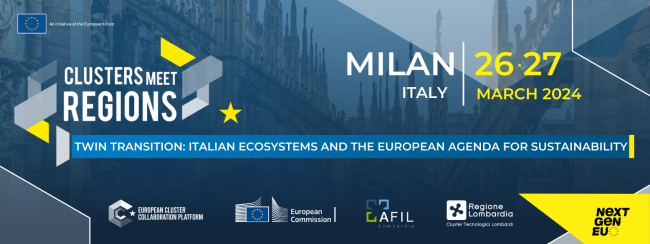
Description
Twin Transition: Italian ecosystems and the European agenda for sustainability.
The case of a complex industrial landscape: the Lombardy clusters
This was the 15th workshop of the successful “Clusters meet Regions” cycle. Organised since 2022 in different EU regions, these events bring together clusters and policymakers of the EU, at national, regional, and local level to learn from each other how to better use clusters to strengthen industrial ecosystems, serve national/regional economic development and liaise with other regions facing similar transition challenges.
The European Cluster Collaboration Platform, on behalf of the European Commission, and in partnership with AFIL – Lombardy Intelligent Factory Association and the Lombardy Regional Authority, jointly organised the next 'Clusters Meet Regions' event in Milan, Italy, on the 26 and 27 March. The event focused on the Twin Transition and addressed three main objectives:
- To analyse the policy effectiveness of central-level strategies and their implementation at the local level.
- To focus on the best practices and models by Italian and European regions, including supportive initiatives for the business, industry and research ecosystem, and provide some examples of their impact.
- To provide an opportunity to build networks and projects among participants.
Download the:
🗓️ Final Agenda
📑Event Input Paper presenting observations on the cluster landscape in Lombardy and outlining key considerations for the future development of the region.
Presented materials in the frame of the event:
Presentation of the Input Paper
- Jan-Philipp Kramer, Head of EU Services, Prognos - download presentation
Pitching session for Clusters:
- Next Technology Tecnotessile Tuscany Fashion Cluster (Enrico Venturini) - download presentation
- MESAP Innovation Cluster (Paolo Dondo) - download presentation
- onTech Innovation (Emilio Rull Quesada) - download presentation
- AAstaff - 100bcity (Ionut Cosmin Bacila) - download presentation
- AB.SIDE Consortium (Lino Olivastri) - download presentation
- TIASI (Sotiris Bouzeas) - download presentation
- Cluster Smart Cities & Communities Lombardia (Riccardo Lo Bue) - download presentation
- bioPmed (Valentina Anrò) - download presentation
- Industrial Research Institute for Automation and Measurements PIAP (Jan Piwiński) - download presentation
- Lombardy Cosmetics System (Sara Tresoldi) - download presentation
- Lombardy Aerospace Cluster (Giulia Fornara) - download presentation
- Ukrainian Cluster Alliance (Olga Millward) - download presentation
- Venetian Cluster (Cosima Trevisanello) - download presentation
- Finnova Foundation (Juan Manuel Revuelta) - download presentation
Pitching session for Start-ups:
- BTF Ski System (Konrad Baumgartner) - download presentation
- H3Cube (Federico Izzo) - download presentation
- SiWeGO (Marcello Favalli) - download presentation
- Snowit (Pasquale Scopelliti - download presentation
CONTEXT AND OBJECTIVES
Since 2012, the Lombardy Region has coordinated nine Technology Clusters which cover the main strategic areas identified at the national policy level. These clusters are in Aerospace, Agrifood, Green Chemistry, Energy, Advanced Manufacturing, Mobility, Life Sciences, Technologies for Smart Communities and Technologies for living spaces.
The process of identification of and support to Clusters in Lombardy was carried out in line with national guidelines within the Smart Specialisation Strategy (S3) and the European Framework Programme for Research and Innovation.
Research and Innovation are a pillar of the sustainable growth of Lombardy. To strengthen this pillar, a solid co-design process with clusters has been established for the development of priorities for each S3 Innovation Ecosystem, fully aligned with the European policies and regional, national and European funding.
Thanks to Clusters and other regional stakeholders, Lombardy is capable of meeting upstream the needs of industrial and innovation ecosystems by:
- identifying the correct technological priorities to support,
- matching social and environmental goals,
- transforming the industrial system into the future essential enabler of the real implementation of sustainability.
Last, but not least, the Technology Clusters contribute concretely to the implementation of innovative processes to enhance the ecosystems’ competitiveness through:
- fostering collaboration between scientific and industrial actors in Clusters;
- facilitating the inclusion of small businesses (micro-, small- and medium-sized enterprises and start-ups) in the Clusters’ communities;
- supporting the Lombardy Region in the process of defining and updating the Research and Innovation Strategy (R&I);
- mapping the skills and promoting excellence of the region in creating and developing new value chains;
- facilitating the creation of consortia to access available resources and exploiting the results of R&I activities in the region.
TARGET GROUPS
The Clusters meet Regions event in Milan brought together onsite over 160 representatives of European Clusters and companies, national and regional public authorities, business support organisations from Italy and other European regions, investors and other actors in industrial innovation.
AGENDA OVERVIEW
The program included: High-level plenary sessions, discussions, pitching sessions and a guided site visit to MIND – Milano Innovation District.
ABOUT LOMBARDY REGION
Read more about the Lombardy region in our dedicated case study on the Clusters Solutions Library.